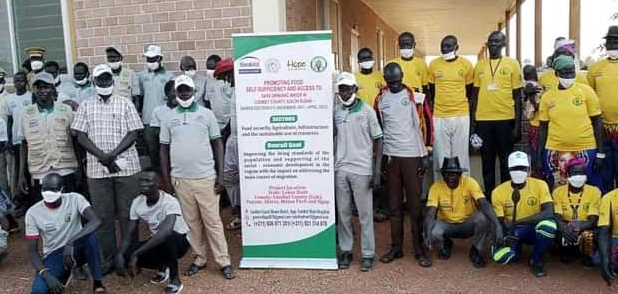The Green Village Network, in partnership with Hope for the Sick and Poor International with support from Slovakia, over the weekend, launched agriculture and water and sanitation projects in Cueibet County of Lakes State.
The project theme; ‘promoting food self-sufficiency and access to safe drinking water’ is targeting over 400 beneficiaries with a promise to provide three water boreholes in three payams and agricultural seeds to farmer communities in Cueibet.
The chairperson of the women association in Cueibet County, Hellena Ajak Lueth, told Radio Tamazuj Monday that the Green Village Network project will benefit the community because of the current prevailing peace.
“We urge the Green Village Network community-based organizations to do early seeds distributions to all the farmers in the community early in March before the first rains start,” Ajak said. “Everything has changed now because there is peace and stability in the community and everyone is willing to cultivate this year.”
She added: “During the launch, the green village network promised that they will distribute agricultural seeds and provide 3 boreholes to the 3 payams of Abiriu, Ngap, and Cueibet. We wanted them to provide more clean drinking water to all the payams and ox-plow farming tools.”
John Chiec Dut, the youth chairman of Cueibet County, said the project was about community livelihood and resilience.
“The Green Village Network has done a lot for us here in Cueibet. They have launched a project that is very fantastic to all the beneficiaries and it was welcomed by all the communities in Cueibet County,” Chiec said. “We expect the youth to have more resilience in terms of cultivation because we are expecting that project will provide us with agricultural tools like ox-plows, seeds, and other things.”
He said the Green Village Network is a community-based organization that has the experience and has been working in the county for almost three years with other donors.
“Now that the government of Lakes State has contained these inter-communal or sectional conflicts, we appeal to the public and to our people to produce food so we do something for ourselves,” Chiec added.




